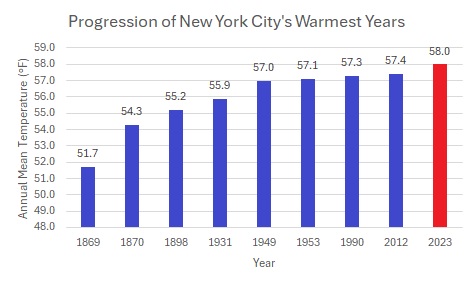PRINT AS PDF
2023 was the warmest year on record globally. 2023 also became the warmest year on record in New York City’s Central Park, where records go way back to 1869 when Ulysses Grant took office as U.S. President, the American Museum of Natural History was established in New York City, and Rutgers University defeated Princeton 6-4 in the first-ever college football game.
2023 got off to a fast start with January’s 43.5° mean temperature toppling the monthly record of 43.2° from 1932. Prior to 2023, 1950’s 41.8° was the closest any year had come to 1932’s seemingly “untouchable” mark. January’s historic warmth was followed by the 3rd warmest February on record. Later, April 2023 would become the second warmest April on record and then 2023’s annual record would be capped off by the second warmest December on record.
Since 1949, New York City’s annual record had stayed within a narrow range, rising from 57.0° in 1949 to 57.4°, in 2012. 2023 came in with a mean temperature of 58.0°.
New York City’s warming climate has led to an increasing frequency of exceptionally warm years. The period beginning in 2000 currently accounts for a disproportionate 50% of 10 warmest years and 65% of 20 warmest years. The last four years have all ranked among the 20 warmest years on record: 2020 (3rd), 2021 (9th), 2022 (18th), and 2023 (1st). The last year where at least 50% of days were cooler than normal was 2009.
Building on the least snowy winter on record where Winter 2022-2023 saw just 2.3” of snow (old record: 2.8”, 1972-1973), 2023 became the least snowy calendar year on record. 2023 saw just 2.3” of snow. The old record was 3.4”, which was set in 1913.
Although year-to-year variability will bring a range of annual outcomes, the long-term trend is toward warmer years, as climate change continues. It is probably more likely than not that 2023’s record will be challenged, if not broken in the next decade or two given the rate temperatures a warming.




